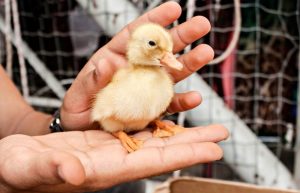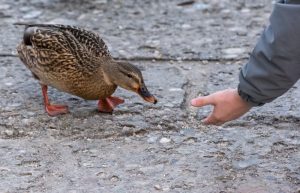
What You Need to Know About Ducks Bonding With Humans
As with any pet or animal, you may be wondering how your pet ducks think of you…if they think of you at all. Ducks are known to be more expressive and friendly compared to other poultry like chickens and guinea fowl. That being said, it can be difficult to tell whether you ducks think fondly of you or if they’re just behaving naturally. In this article, I will share all I know about how to bond with your pet ducks.
Do ducks bond with humans? Ducks are known to build bonds with humans that are similar to the bond a dog would build with its owner. When raised by humans from the time of hatching, a duck will tend to bond to its owner like it would a flock of ducks. Ducks are expressive animals that can make it quite clear that they like seeing you and spending time with you.
Building a bond with an animal can help the animal look forward to the time it spends with you and can help it feel more trusting during medical and otherwise stressful situations. I will share some ways you can connect with your ducks and help to build a relationship between you and them.
How Can I Build a Bond With My Pet Ducks?
An animal that is bonded with you can be much easier to handle on a day-to-day basis and also in less frequent circumstances like when the animal may need medical attention or special care. It can also make your interactions more enjoyable and pleasant for everyone involved. Here are some ways you can start building a bond with your pet ducks:
Bond With Your Duck Through Imprinting
When you talk about bonding with ducks, you’ll often hear the term “imprinting.” Imprinting is a natural occurrence that happens between baby animals and their mothers, or a specific species. When a baby animal is born, it will have much interaction with its mother and its own species within its first few days of life. Through these interactions, the baby will develop habitual trust for the mother or the animals in its social community.
Many ducklings that are raised by humans imprint on people rather than ducks. Through the care you provide the duckling within the first few days of its life, it will form that habitual trust that will affect it for the rest of its life.
If you want to bond with your ducks through imprinting, it’s vital that you regularly handle ducklings the first few days of their lives, even being the first “animal” the ducklings see after hatching. With all that said, there are some consequences that come with imprinting. Here is a list of some things to consider before going through the imprinting process:
- If a duck imprints on you, it now sees you as its mother. This means it will look to you for all its needs.
- An imprinted duck will think it’s a human; this can make it more difficult for the duck to live in a flock. If a duck has imprinted on you, it would be better for the duck to live in closer relation to humans rather than other ducks.
- A duck that has imprinted on a human may feel stressed and anxious any time it is not around humans. This can lead to other negative health conditions.
- An imprinted duck will look to you for the majority of their social interaction. This means that you are going to have to commit time to not only caring for your duck but also interacting with it regularly throughout your day.
You have to be dedicated if you want to use the imprinting method to bond with your duck, and it has to be done when the duck is just a new hatchling. There are easier and simpler methods that can be used to build a bond with your duck that will still enable your duck to thrive in a flock setting and be more independent from humans.
Bond With Your Duck By Spending Time With Them
One of the simplest ways to bond with your pet ducks or any animal or human is simply to spend time with them. When it comes to animals, familiarity builds trust. The more your ducks see you and get to interact with you, the more they will start to trust you.
Prey animals are naturally alert, skittish, and flighty since they are the ones being hunted. At any sign of danger, they will flee to escape. As prey animals, ducks will naturally be more apprehensive of new objects, animals, or humans until they see that there is no threat or intention of harm. Since most ducks are used to human interaction from a young age, they won’t be as flighty or skittish. Ducks that haven’t had much human interaction throughout their life will be more wary or watchful of humans.
Bond With Your Duck By Following a Routine
All animals love a routine; it helps them learn when they can expect to eat, interact, and go to sleep. Most people have a routine for their ducks. The ducks wake up to be let out of their coop in the morning and are given feed and scratch. In the afternoon, their owner may come into their enclosure to clean the coop and play with the ducks. In the evening, the ducks will be shut in the coop to rest for the night.
If you watch ducks in the wild, you’ll notice that they have their own routine they’ve come up with. In the morning, they may go float and clean in a pond. At noon when the sun is at its highest, the ducks will bathe and rest in the sun. In the afternoon, they’ll browse through the grass looking for snacks of bugs.
As mentioned above, ducks are natural prey animals. Prey animals thrive on routine since it provides them with the opportunity to learn what to expect. This means they can’t be caught off-guard. A prey animal that doesn’t have a routine will naturally be more anxious. By keeping to a set routine, your ducks will expect to see you and interact with you throughout the day.
Bond With Your Duck By Feeding Them
 We all know by now that just about every animal is food-driven. There’s no better way to get your ducks to feel more fond of you than by feeding them. By doing this, your ducks will learn to associate you with the positivity of eating. Using food can also be a great way to get your ducks to be confident in approaching you and being around you. We’ve all seen the ducks at the duck pond that come running over when they see people with bread crumbs approaching!
We all know by now that just about every animal is food-driven. There’s no better way to get your ducks to feel more fond of you than by feeding them. By doing this, your ducks will learn to associate you with the positivity of eating. Using food can also be a great way to get your ducks to be confident in approaching you and being around you. We’ve all seen the ducks at the duck pond that come running over when they see people with bread crumbs approaching!
Besides providing your ducks with basic duck feed, you can also help warm their hearts by giving them tasty treats and snacks. I used to walk out of the house every evening to keep our poultry leftover fruits and vegetables, and they’d all come running over as soon as I opened the front door. Ducks also like cracked corn, oatmeal, kale, and cabbage. Try giving treats throughout your time interacting with your ducks, as it can help them to keep a positive association with you.
How to Tell If My Duck Likes Me
Since animals can’t speak, it can be difficult to understand what they are feeling and how they feel specifically of you. Ducks, however, are known to be quite expressive, making it easier to understand how they feel about you. Ducks will mainly use body language to communicate with you. Here are some things to look for to be able to tell if your duck likes you:
A Duck That Likes You Will Approach You
First and foremost, a duck that likes you or feels comfortable around you will be willing to approach you. As I mentioned earlier, prey animals will naturally be more wary and reluctant to approach things they don’t trust. If a duck approaches you, it means it trusts you. A duck that has imprinted or is just really fond of humans may even follow you around!
A Duck That Likes You Will Chirp At You
If you ever watch ducks communicate with each other, they’re constantly chirping and chatting. If a duck is familiar with you and feels comfortable around you, it may try to communicate with you through that same chirping.
Ducks will use other verbal queues to communicate with you as well. If a duck hisses or squawks at you, this is a good sign that the duck feels threatened or wary and wants you to back off. It’s important to be able to understand the feeling behind the verbal queues to determine how your ducks think of you.
A Duck That Likes You Will Be Relaxed Around You
A duck that trusts you and likes you will naturally be relaxed around you. A relaxed duck has feathers that lay flat and will waddle around rather than run. They’ll also feel comfortable enough to go about their normal activities, like preening and cleaning.
A duck that doesn’t trust you or sees you as a threat will fluff up their feathers and stand more erect to make themselves seem taller and more intimidating. Your duck’s behavior towards you can signal to you whether you need to step back and stop pestering them or if you are welcome to approach and play.
We have many articles on how to care for your pet ducks. If you’re looking for more reading material, check out the articles below!
- Do Ducks Get Lonely? What You Need to Know
- Do Ducks Get Cold? Essential Care Guide
- Do Ducks Need a Coop: What You Need to Know
